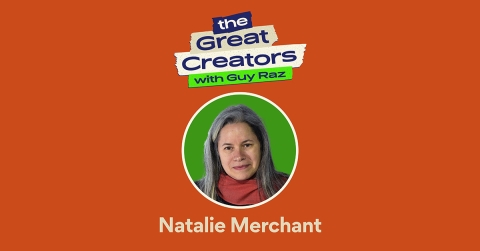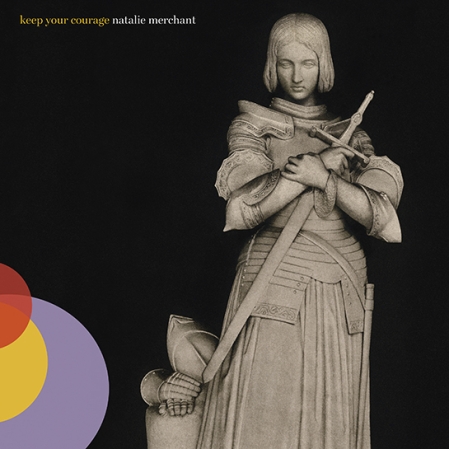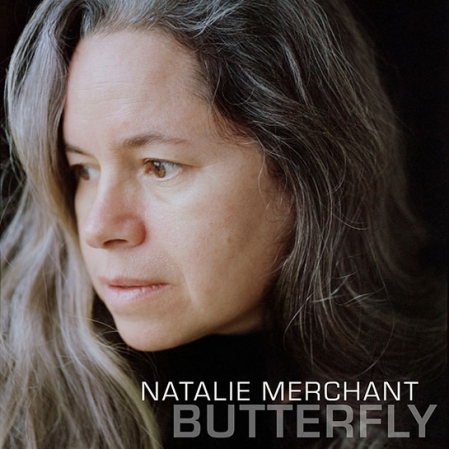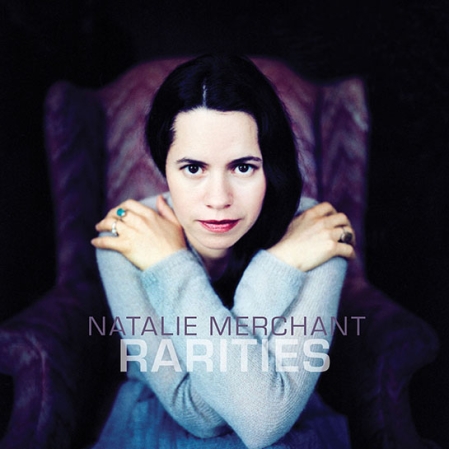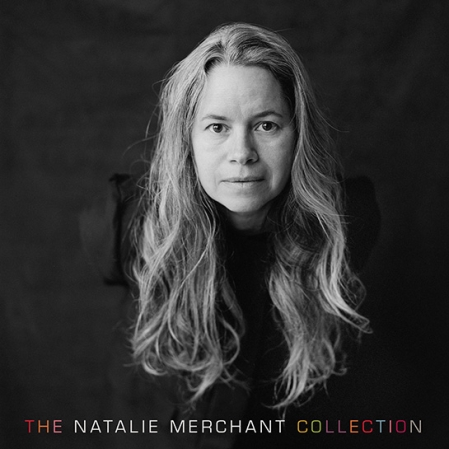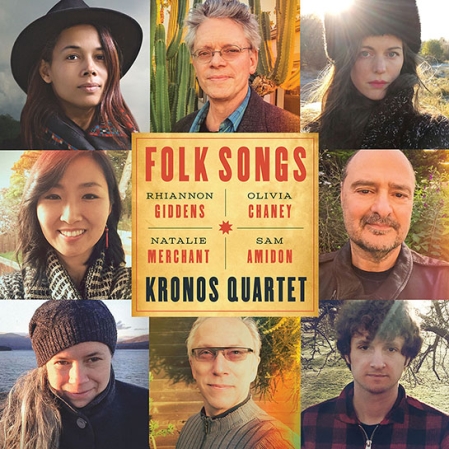For her first studio recording in seven years, Natalie Merchant offers the most ambitious project of her celebrated, 25-year major-label career. She brilliantly adapts the works of such poets as Edward Lear, Ogden Nash, and Robert Graves into a musically kaleidoscopic, two-disc set of new songs, working with folk, jazz, reggae, and R&B players as well as gorgeously arranged chamber ensembles.
Leave Your Sleep, Natalie Merchant's first studio album since 2003’s The House Carpenter’s Daughter, released April 13, 2010, on Nonesuch Records. This release is the culmination of seven years’ research and collaboration and is, in Merchant’s words, “the most elaborate project I have ever completed or even imagined.” Take a look inside the album package at nonesuch.com/media.
A two-disc set, Leave Your Sleep is a collection of songs adapted from poems selected by Merchant including pieces by both well-known and obscure writers. Featured are works by British Victorians, early- and mid-20th century Americans and contemporary writers as well as anonymous nursery rhymes and lullabies. Among the authors included are Ogden Nash, E.E. Cummings, Robert Louis Stevenson, Christina Rossetti, Edward Lear, Gerard Manley Hopkins, and Robert Graves.
In addition to a new method of lyricism, Merchant stretches out musically on Leave Your Sleep by collaborating with a broad spectrum of artists—some old friends, some she has admired from afar—including the Wynton Marsalis Quartet, Medeski Martin & Wood, members of the New York Philharmonic, The Klezmatics, Lúnasa and Hazmat Modine. “The sessions were recorded in live ensemble settings to capture a fresh and spontaneous energy,” notes Merchant. “They were some of the most magical experiences I’ve ever had making music.”
Having sold millions of records worldwide over the course of her recording career, Merchant has remained busy in the time since her last studio album by curating compilations for both 10,000 Maniacs’ Campfire Songs and her own Retrospective. Additionally, Merchant performed live to the accompaniment of Philip Glass, Dr. John, Pete Seeger, and Wynton Marsalis and collaborated with British composer Gavin Bryars as part of The Royal Shakespeare Company’s Complete Works series.
About the project, Merchant writes:
This new collection of songs, Leave Your Sleep, is my first studio album since 2003. It is the most elaborate project I have ever completed or even imagined.
I have always loved many different styles of music but had barely scratched the surface of those genres on my own recordings. This time in the studio I really wanted to experiment so I called on some of the most accomplished musicians in Cajun, bluegrass, reggae, chamber, and early music, jazz, and R&B, as well as Balkan, Chinese, and Celtic folk. Some were old friends and some were artists whose work I had admired from afar, such as The Wynton Marsalis Quintet; Medeski, Martin & Wood; The Klezmatics; members of the New York Philharmonic; Lúnasa; The Chinese Music Ensemble of New York; The Memphis Boys; Katell Keineg; and Hazmat Modine. The sessions were recorded in live ensemble settings to capture a fresh and spontaneous energy; they were some of the most magical experiences I’ve ever had making music.
The lyrics for Leave Your Sleep are another departure from the way I had written for the past 28 years. I decided to adapt poetry to music that had been created by other writers. I chose works by both well-known and obscure poets, ranging from anonymous nursery rhymes and lullabies to poems by British Victorians, early- and mid- 20th Century Americans, and a few contemporary writers. Ogden Nash, E.E. Cummings, Robert Louis Stevenson, Christina Rossetti, Edward Lear, Gerard Manley Hopkins, and Robert Graves are among the most well known of the group.
It was exciting for me to work with rhythm and rhyme schemes by these poets, which I did over the course of four years. The poems inspired vastly different musical settings with themes that ranged from humorous and absurd to tragic, romantic, and deeply spiritual.
The recording took a full year to complete, involving 130 musicians. My co-producer was Andres Levin, who has worked with Marisa Monte, David Byrne, Carlinhos Brown, and Orishas. Leave Your Sleep was engineered by Nick Wollage, a British soundtrack recordist for such films as Atonement, Pride and Prejudice, Miss Potter, Gosford Park, and The Merchant of Venice. The mixing was done by the legendary Steven Rosenthal in his downtown Manhattan studio, The Magic Shop.
PRODUCTION CREDITS
Produced by Natalie Merchant and Andres Levin
Recording Engineer: Nick Wollage
Assistant Engineer: Eli Walker
Recording Studio: The Clubhouse, Rhinebeck, NY
Second Assistant Engineer: Dustin Wicksell
Studio Manager: Paul Antonell
Catering: Jennifer McKinley
Additional recording at Avatar Studios, New York, NY (Assistant Engineer: Rick Kwan); Legacy Recording Studios, New York, NY (Assistant Engineers: Angie Teo, Derik Lee & Peter Wolford); and The Sound Kitchen, Nashville, TN (Engineer: Nick Brophy; Assistant Engineer: Adam Deane)
Mix Engineer: Steve Rosenthal
Mix Studio: The Magic Shop
Assistant Engineer: Eli Walker
Second Assistant Engineers: Brian Thorn & Kabir Hermon
Mastering Engineer: Robert C. Ludwig at Gateway Mastering Studios
Project Coordinators: Sue Berger & Megan Ingalls
Biographical Research: Ella Reily Stocker, Anna Eyre, Erin Casey & Kathie Pitman
Photo Researcher/Licensing Coordinator: Sarah Cullen
Photo Restoration: Sebastian Wintermute
Cover Photograph: Mark Seliger
Interior Photographs: Marion Ettlinger & Mark Seliger
Package Design: David Pearson
522304
MUSICIANS
Natalie Merchant, vocals
Lúnasa: Trevor Hutchinson, upright bass (1.01; 2.02, 08, 10); Kevin Crawford, low whistle (1.01; 2.10), tin whistle (2.02), bodran (2.02), vocals (2.02), flute (2.08); Paul Meehan, acoustic guitar (1.01; 2.02, 08, 10); Cillian Vallely, uilleann pipes (1.01; 2.02, 10), low whistle (2.08); Sean Smyth, fiddle (1.01; 2.02, 08) Sandra Park, Sharon Yamada, violin (1.01, 02, 06; 2.06, 12)
Lisa Kim, Ann Lehmann, Arnaud Sussmann, Minyoung Baik, Shan Jiang, Matt Lehmann, violin (1.01; 2.06, 12)
Robert Rinehart, viola (1.01; 2.06, 12)
Karen Dreyfus, viola (1.01, 02, 06; 2.06, 12)
Eileen Moon, cello (1.01, 02, 06; 2.06, 12)
Jeanne LeBlanc, cello (1.01; 2.06, 12)
Jeremy McCoy, bass (1.01; 2.06, 12)
Meridian Arts Ensemble: Jon Nelson, trumpet; Daniel Grabois, horn; Benjmin Herrington, trombone; Brian McWhorter, trumpet; Raymond Stewart, tuba (1.02)
Artis Wodehouse, pump organ (1.02)
Greg Cohen, bass (1.02)
Gabriel Gordon, guitar (1.03, 10; 2.01, 09)
Judy Hyman, fiddle (1.03; 2.01, 09)
Richard Stearns, banjo (1.03, 10; 2.01, 09)
Mark Murphy, upright bass (1.03, 10; 2.01, 09)
Bill Spence, hammer dulcimer (1.03, 10; 2.09)
Wynton Marsalis, trumpet (1.04, 2.04)
Daniel Nimmer, piano (1.04, 2.04)
Ali Jackson, drums (1.04, 2.04)
Walter Blanding, saxophone (1.04, 2.04)
Carlos Henriquez, bass (1.04, 2.04)
Doug Wamble, guitar (1.04, 2.04)
The Fairfield Four (1.04, 12, 13): Isaac Freeman, Edward Hall, Robert Hamlett, Joe Rice, Joseph Thompson, vocals
Medeski Martin & Wood (1.05): John Medeski, piano; Billy Martin, drums; Chris Wood, bass
Michael Leonhart, horn arrangement, trumpet (1.05)
Dan Levin, bass trombone, tuba, alto horn (1.05)
Dieter Hennings, acoustic guitar (1.05, 2.07)
Katell Keineg, vocals (1.05, 06)
Wang Guo Wei, erhu (1.06)
Weng Po Wei, dizi flute (1.06)
Sun Li, pipa (1.06)
The Klezmatics (1.07): Richi Barshay, frame drum, poyk, snare drum; Lorin Sklamberg, accordion; Paul Morrisset, acoustic bass guitar, baritone horn; Matt Darriau, alto sax, clarinet, bass clarinet; Frank London, trumpet, alto horn; Lisa Gutkin, fiddle; The Klezmatics, gang vocals
Marc Friedman, bass (1.08)
Erik Della Penna, guitar (1.08)
Dan Aran, drums, percussion (1.08)
Greg Heffernan, cello (1.08)
Uri Sharlin, accordion (1.08)
Gilad Harel, clarinet (1.08)
John Roberts, concertina, voice of the manservant (1.11)
Dieter Hennings, baroque guitar, theorbo (1.11)
Motomi Igarashi, viola da gamba (1.11, 2.07)
Deidre Rodman, harpsichord (1.11)
Nina Stern, recorder (1.11, 2.07), chalumeau (1.11)
Hazmat Modine: Rich Huntley, drums (1.12, 13); Pete Smith, electric guitar (1.12), banjo (1.13); Steve Elson, baritone saxophone (1.12, 13), B-flat clarinet (1.12), clarinet (1.13); Pam Fleming, trumpet (1.12, 13); Michael Gomez, dobro (1.12), lap steel (1.13); Wade Schuman, diatonic harmonica (1.12, 13); William Barrett, chromatic harmonica (1.12, 13); Joseph Daley, tuba (1.12, 13)
The Ditty Bops (1.13, 2.04): Abby DeWald, Amanda Barrett, vocals
Blake Miller, accordion (2.01)
Clark Gayton, trombone (2.03)
Horace James, keyboards (2.03)
Hoova Simpson, bass (2.03)
Andrew Bassford, guitar (2.03)
Larry McDonald, percussion (2.03)
Paul Sutton, drums (2.03)
Gerald Johnson (2.03)
Eddie Allen (2.03)
Joanne Williams, Kimberly Miller, vocals (2.03)
Victor Goines, clarinet (2.04)
Wycliffe Gordon, trombone (2.04)
James Spake, saxophone (2.05)
The Memphis Boys (2.05): Bobby Wood, piano, Wurlitzer; Bobby Emmons, Hammond; Gene Chrisman, drums; Reggie Young, guitar; Michael Leech, bass
Wayne Jackson, trumpet (2.05)
Jack Hale, trombone (2.05)
Sherry Sylar, oboe (2.06, 12)
Marc Goldberg, bassoon (2.06, 12)
Lino Gomez, bass clarinet (2.06, 12)
Phil Myers, Michelle Baker, Erik Ralske, Howard Wall, French horn (2.06, 12)
Mike Davis, Birch Johnson, tenor trombone (2.06, 12)
George Flynn, bass trombone (2.06, 12)
Kyle Turner, tuba (2.06, 12)
Erik Charlston, percussion (2.06, 12)
Ina Zdorovetchi, harp (2.06, 11, 12)
Bruce Creditor, clarinet (2.11)
Jessica Lizak, flute (2.11)
Mihail Jojatu, Owen Young, Alberto Parrini, cello (2.13)
Joseph Fire Crow, Native American flutes, drums, rattles, speaking (2.13)
Jennifer Kreisberg, chanting (2.13)
Sean O'Loughlin & Natalie Merchant, string arrangement (1.01), orchestration (2.06, 12)
Stephen Barber & Natalie Merchant, string arrangement (1.02)
Natalie Merchant & Stephen Barber, arrangement (1.06)
Natalie Merchant, arrangement (1.11; 2.07, 11)
Wynton Marsalis, arrangement (1.04, 2.04)
Clark Gayton, trombone (2.03)
James Spake, horn arrangement (2.05)
Stephen Barber, string arrangement (2.13)




